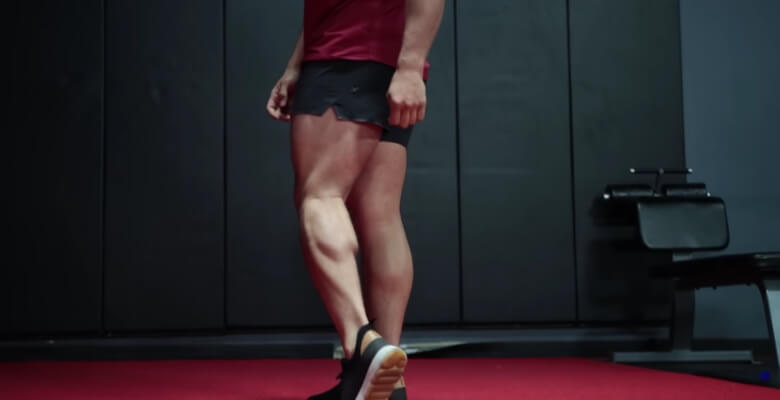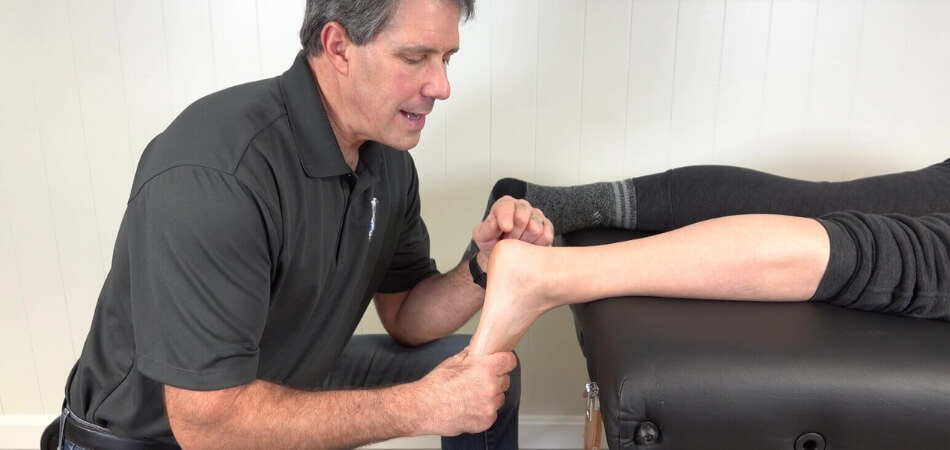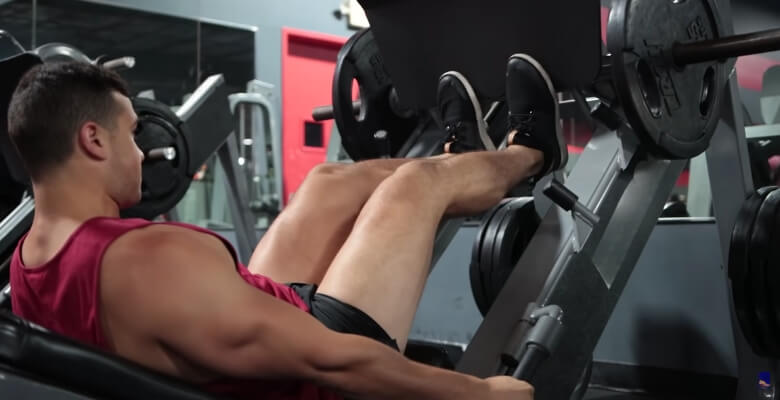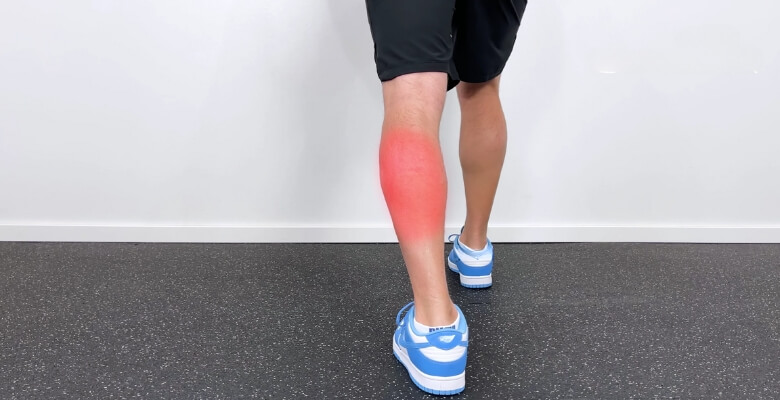Our revolutionary new socks are here! My-Happy Feet Socks! It’s like slipping into a comforting hug for tired feet, relieving them of the strain and stress of the day. Now let’s explore a common question: Can tight calves cause foot pain?
Yes, tight calves can lead to foot pain. Tight calf muscles can alter your gait, causing increased pressure on the feet and potentially leading to conditions like plantar fasciitis or Achilles tendinitis. Stretching and proper footwear can help alleviate both calf tightness and foot pain.
In this article, we’ll explore how tight calves affect foot health and offer strategies to soothe aching soles. Read on to learn how to put your best foot forward!
What Are Calves?
Calves are the muscles located on the back of your lower legs. They play a crucial role in activities like walking, running, and jumping. Keeping your calves strong and flexible is essential for overall lower body health.

One way to care for your calves is by wearing supportive footwear like My-Happy feet socks ,which can provide extra cushioning and support. Additionally, regular stretching and strengthening exercises can help prevent injuries and improve flexibility in your calves.
Remember to listen to your body and give your calves proper rest after intense workouts to promote recovery and prevent overuse injuries.
Can Tight Calves Cause Foot Pain?
Can Tight Calves Cause Foot Pain? Yes, tight calves can indeed cause foot pain. When the muscles in your calves become tight, they can pull on the Achilles tendon, which connects the calf muscles to the heel bone. This tension can lead to various issues that result in discomfort and pain in the feet.

Muscle Imbalance
Muscle tightness in the calves can create an imbalance in the muscles and tendons of the foot and ankle. This imbalance can cause strain and overuse of certain foot structures, leading to pain and discomfort.
Restricted Range of Motion
Tight calves can limit the range of motion in the ankle joint. When the ankle doesn’t have its full range of motion, it can affect how the foot functions during activities like walking or running, potentially leading to pain and discomfort.
Altered Biomechanics
Tight calves can alter the biomechanics of the feet and ankles. This alteration can affect how weight is distributed across the foot while standing, walking, or running, putting excess stress on certain areas and causing pain.
Nerve Compression
Tight calf muscles can compress nerves that run through the lower leg and into the foot. This compression can lead to conditions like tarsal tunnel syndrome, where the nerves become pinched, resulting in pain, numbness, and tingling in the foot.
How to Release Tight Calves?
Many factors can contribute to tight calves, including overuse, inadequate stretching, and improper footwear. Stretching, massage, and proper hydration can relieve this tightness. Follow these steps to release tight calves and improve flexibility and comfort.

- Warm-Up: Begin by gently warming up your calves with light activities such as walking or cycling for 5-10 minutes. This increases blood flow and prepares your muscles for stretching.
- Calf Stretch: Stand facing a wall with one foot forward and the other back. Keep both heels flat on the ground and bend the front knee while straightening the back leg. Lean forward until you feel a stretch in the calf of the back leg. Hold for 20-30 seconds and switch sides.
- Towel Stretch: Sit on the floor with your legs stretched out in front of you. Loop a towel around the ball of one foot and gently pull it towards you while keeping your knee straight. Hold for 20-30 seconds and switch sides.
- Foam Rolling: Sit on the floor and place a foam roller under your calves. Lift your body off the ground with your hands and roll back and forth from your ankles to just below your knees. Apply gentle pressure and focus on any tight spots for 1-2 minutes.
- Massage: Use your hands or a massage tool to apply pressure to the calves, focusing on areas of tightness. Use long, sweeping strokes and gradually increase pressure as tolerated. Spend 5-10 minutes massaging each calf.
- Hydration and Nutrition: Ensure you’re adequately hydrated and consuming enough electrolytes, as dehydration can contribute to muscle tightness. Incorporate potassium-rich foods like bananas and magnesium-rich foods like leafy greens into your diet to support muscle function.
- Rest and Recovery: Allow your calves time to rest and recover between workouts. Avoid overtraining and incorporate rest days into your routine to prevent muscle fatigue and tightness and follow doctor-recommended foot care techniques.
- Gradual Progression: When returning to activity after a period of tightness, gradually increase intensity and duration to avoid straining the calves. Listen to your body and adjust as needed to prevent further tightness or injury.
What Problems Do Tight Calf Muscles Cause?
There are a variety of issues that can be triggered by tight calf muscles that can affect your day-to-day life and your physical performance. To effectively manage tight calves, you must understand the problems associated with them, from discomfort to decreased mobility.

Discomfort and Pain
Tight calf muscles can cause discomfort and pain, especially during activities that involve ankle movement, such as walking or running. This discomfort may range from a dull ache to sharp pain, hindering everyday tasks and physical activities.
Limited Range of Motion
When calf muscles are tight, they can restrict the range of motion in the ankles, making it difficult to flex or point the foot fully. This limited range of motion can affect various activities, including walking, running, and even simple tasks like climbing stairs or squatting.
Increased Risk of Injury
Tight calf muscles increase the risk of injuries, such as strains or tears, especially during physical activities that require sudden movements or changes in direction. Restricted flexibility in the calves can also contribute to overcompensation in other muscles, leading to imbalances and further injury risks.
Poor Posture
Tight calves can impact overall posture by altering the alignment of the lower body. This can lead to compensatory movements in other areas, such as the lower back or hips, causing strain and discomfort. Over time, poor posture may contribute to chronic issues and musculoskeletal imbalances.
Foot Problems
Tight calf muscles can affect the mechanics of the feet, leading to issues such as plantar fasciitis or Achilles tendonitis. These conditions result from increased tension on the connective tissues of the foot and ankle, causing pain and inflammation that can interfere with daily activities.
Decreased Athletic Performance
Athletes with tight calf muscles may experience decreased performance due to reduced power, agility, and efficiency of movement. Tightness in the calves can impair biomechanics, affecting running gait, jumping ability, and overall athletic performance.
FAQs for Can Tight Calves Cause Foot Pain?
Are you curious about the impact of tight calves on foot pain? To help you understand the connection and find relief for your discomfort, here are 8 frequently asked questions.
What Are Some Signs that Tight Calves Are Causing Foot Pain?
Answer: Signs include discomfort or pain in the arches, heels, or balls of the feet, especially during activities like walking or running. Limited ankle mobility may also indicate tight calves.
How Can Tight Calves Affect Foot Biomechanics?
Tight Calves Alter Foot Biomechanics by Redistributing Weight Unevenly, Potentially Leading to Excess Stress on Certain Areas of the Foot. This Can Result in Pain and Discomfort Over Time.
Is There a Link Between Tight Calves and Conditions Like Plantar Fasciitis?
Yes, tight calves can contribute to plantar fasciitis by causing strain on the plantar fascia, the ligament that supports the arch of the foot. This strain can lead to inflammation and pain.
Can Tight Calves Cause Achilles Tendonitis?
Tight calves can indeed lead to Achilles tendonitis by placing increased tension on the Achilles tendon. This can result in inflammation, pain, and stiffness in the back of the heel.
Do Tight Calves Affect Foot Posture?
Yes, tight calves can impact foot posture by altering the alignment of the lower body. This can lead to compensatory movements and strain in other areas, causing discomfort.
Are There Exercises to Help Alleviate Foot Pain Caused by Tight Calves?
Yes, stretching exercises like calf stretches and foam rolling can help release tension in tight calves, reducing foot pain and improving overall mobility and comfort.
Can Wearing Supportive Footwear Help with Foot Pain from Tight Calves?
Supportive footwear can provide extra cushioning and stability, helping to alleviate foot pain caused by tight calves by reducing pressure on the feet and promoting proper alignment.
How Long Does It Take to See Improvements in Foot Pain with Calf Stretching Exercises?
Improvement timelines vary depending on individual factors like the severity of tightness and consistency of stretching. However, regular stretching can lead to noticeable improvements in foot pain over time.
Final Thought
Tight calf muscles can indeed adversely affect the health of your feet and your overall well-being. They can cause discomfort and limited mobility, as well as increased injury risk. Foot and posture problems can affect your athletic performance as well as your tight calves.
So, what’s the verdict on the question, “Can Tight Calves Cause Foot Pain?” The answer is a resounding yes. Having tight calf muscles can cause foot pain by altering your biomechanics, creating muscle imbalances, and limiting your range of motion.
The good news is that relief is within reach. You can relieve calf tightness and alleviate your aching soles by incorporating strategies like stretching, proper footwear, and adequate rest into your routine.






